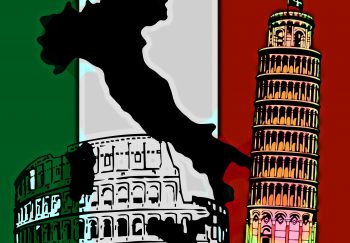Because I am out of town caring for a mother after surgery, I decided to republish an older piece. This is a blast from 2014, in case it wasn’t already! When I return home, I will be back with new articles.
It’s easy to believe we already know the basics of the Italian language, even before we get on the plane to Rome. This is something I do. I used to tell my Italian students that they wouldn’t starve after having eaten many meals at Italian restaurants. The truth is that even though some Italian words may not sound foreign to you, there are cultural nuances that you won’t be able to understand unless you’re familiar with the culture.
Consider, for example, the word Ciao. It can be used to mean “hello” or “goodbye”. It has become a universal greeting. Yet? It’s a mistake to say it while traveling in Italy.
You know what I mean? Let me explain.
Ciao: A Short History
Although the word Ciao (pronounced CHOW), is commonly referred to as Italian, its roots are in the Venetian dialect. This dialect is rich in English words, but that’s another topic. The phrase sciao vostro, which is a Venetian dialect word, means “I am your slave”. Over time, however, the phrase was simplified to s-ciao while keeping the original meaning. YA
This history has led to Italians, even those not Venetian speaking and understanding the Venetian dialect, to know that ciao should not be used as a casual greeting. It’s an informal greeting that’s too informal for polite company. This is especially true for older generations.
This is what it means for you, the traveler. This means that you will need an alternative to ciao if you wish to greet a shopkeeper, waiter or passer-by in the street.
(adsbygoogle = window.adsbygoogle || []).push({});
Other ways to say hello/goodbye (aside from Ciao)
Unfortunately, the universal application of ciao (which can be used to say hello and goodbye) doesn’t work with any of these alternatives. It depends on the time of day for these options.
- veh), which means a polite but not overly formal “hello.” It’s short, it’s easy to pronounce, and it doesn’t matter what time of day it is – you can greet someone with salve day or night. It’s only a greeting and not a way to say “goodbye”.
- JOR It’s legal to say “buongiorno”, but it’s not correct to use it as a goodbye.
- buon pomeriggio If you’re looking to make your time-of day greetings more special, grab a buon pimeriggio from the hat. It means “good afternoon”, and is used from around lunchtime to evening. eh
- ah SEH Although it is technically a goodbye like “buongiorno”, it is more appropriate to say “buona sera” when you part.
- arrivederci – You’ve probably heard arrivederci (pronounced ah|ree|veh|DEHR|chee) before, but this is also the informal version of a more formal greeting (and when you don’t know someone, it’s best to always default to the formal). If you are already acquainted with someone and they have used arriveerci on them, you can use it back. This does not mean “hello,” but “goodbye.”
- ree This one, like arrivederci is a “goodbye”.
For the record, I always use salve or any buongiorno/buona se option that is appropriate for the day.
But, I heard an Italian saying ciao…
The thing is, you will hear the Italian word ciao a lot when you travel to Italy. You’ll then wonder why I bother to make such a fuss. You’ll notice that people who use it together are often very familiar. They’re not just passing money on the street, or exchanging goods for money. A teenager from Italy will wave goodbye to her friends and give them a few cheek kisses and a ciao. But she’ll still go on to use one of these other options on an older person or stranger.
Italian is a living language. Some of it is changing. It is possible that ciao will soon be acceptable and no longer carry the “slave” connotations. However, even if this happens, Italian is still one of the languages with a formal and an informal version. It’s not a good idea to start learning the informal. Before I understood what was happening, I received more than a few unappreciative glances from Italians.
Are you going to make mistakes? Sure. We all do. If you can avoid it, saying salve instead of Ciao might get you on the Italian’s side. You may be able to receive compliments on your language skills and a big smile. They are grateful when we succeed in learning their language and they show genuine gratitude.











